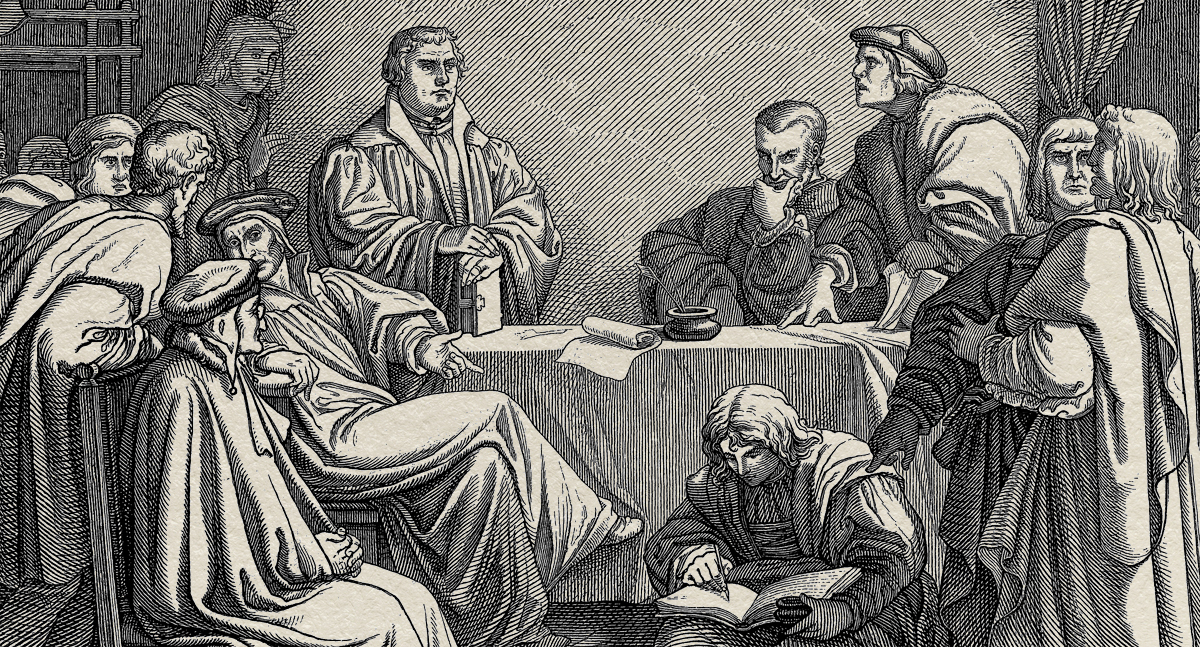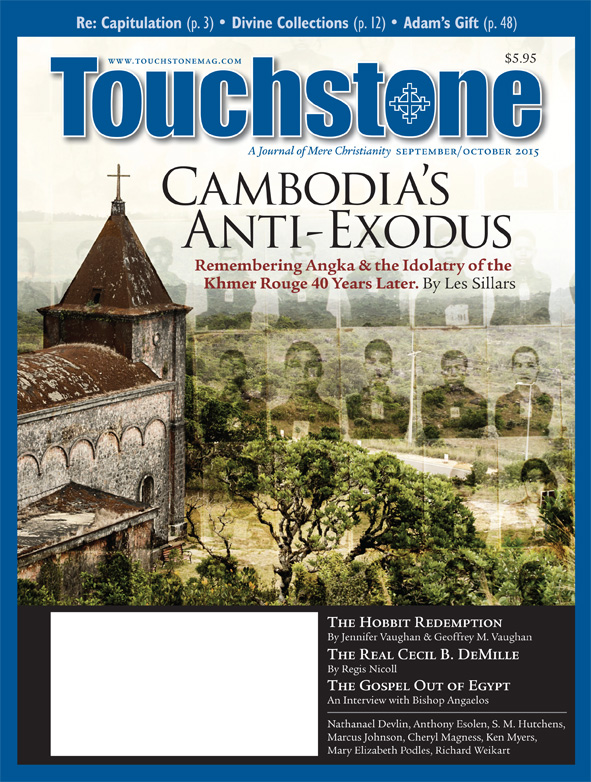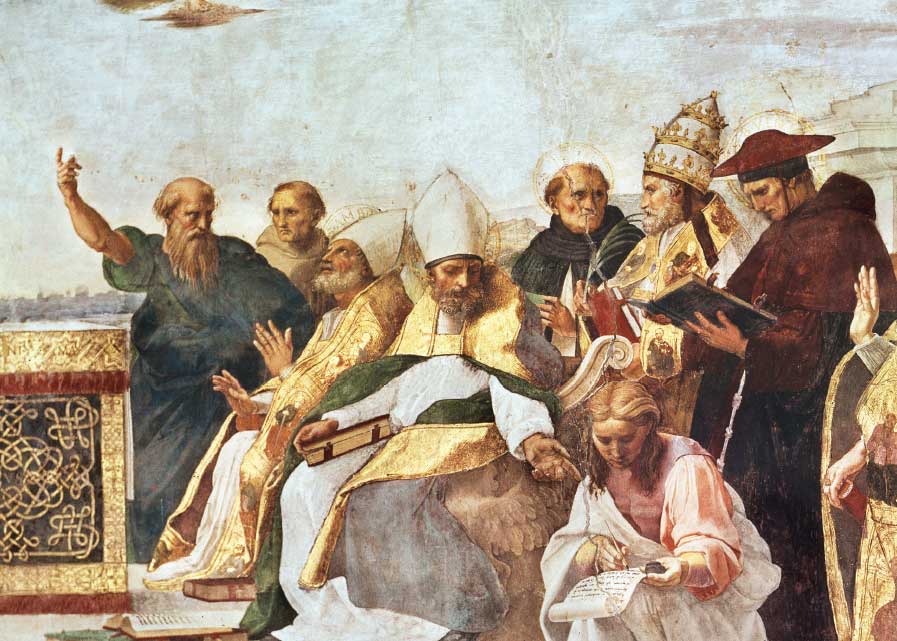View
Who's Your Teacher?
Marcus Johnson on Our Sacred Duty to Teach the Devil to Death
Martin Luther's prescription for pastors and preachers (including himself) who neglect the catechetical training of their congregation was characteristically colorful and coarse: "we deserve not only to be given no food to eat, but also to have the dogs set upon us and to be pelted with horse manure." Pelted with equine feces after the hounds have been released? Even if his prescription is not to be taken literally—although all bets are off with the cantankerous Reformer—Luther's zeal for the catechetical instruction of the Church is unmistakable. Those (especially pastors) who are ignorant of the basics of the catechism, or who despise it through negligence, thought Luther, "should not be numbered among Christians." They are "lazy bellies and presumptuous spirits," "completely unskilled and incompetent teachers" who "live like simple cattle and irrational pigs." Conclusion: "Shame on you forever!"
If we resist the temptation to dismiss Luther's polemical zeal on account of his notorious temperament, we may wonder why he is so impassioned for something about which contemporary Christians are often passionless. There is one obvious reason, which even the apathetic can understand: A catechism is a textbook in the school of God's Word, the Church, serving as a summary of the teachings of Holy Scripture. Typically framed around the Ten Commandments, the Lord's Prayer, and the Apostles' Creed, a catechism draws out the riches of the gospel of Christ Jesus for the benefit of the Church's life and worship. It seeks, in other words, to orient the Church to Reality. In this regard, Luther's passion for catechesis simply represents a pastoral concern characteristic of the historic Christian Church.

The Parasitic Peddler
There is another reason for Luther's catechetical zeal that was obvious enough to him, but about which the contemporary Church appears increasingly oblivious. When the Church shirks its catechetical responsibility, the result is notthat it goes un-catechized. Far from it. The result, rather, is that, by default, the Church comes under the tutelage of that unholy adjunct, the devil, whom Luther calls "a master of a thousand arts." No slacker himself, he is eager to teach where the Church is silent, with his own commandments, his own prayer, his own creed, and his own "good news." He is, in other words, a master catechizer. We labor under a false dichotomy when we ask whether or not the Church will be catechized. The answer is always yes. The question is not whether, but by whom?
Broaching the topic of the devil brings to mind the words of C. S. Lewis's imaginary interlocutor in Mere Christianity: "Do you really mean, at this time of day, to re-introduce our old friend the devil—hoofs and horns and all?" That many in the Church continue, in our day, to entertain a comically naive notion of Satan, that pointy-tailed, trident-toting lord of the fiery underworld, is no laughing matter. A devil rendered comical is only minimally dangerous, because he lacks subtlety. But it is precisely his subtlety that is dangerous.
Part of what makes the devil a master in the catechetical arts, and what makes the Church frequently oblivious to his stratagem, is the deft employment of subterfuge, the concealment of what is demonic under false pretenses. Unlike the Church's Lord, the devil is never forthright. The design of his unholy catechesis is to seduce Christ's Bride, and like all seducers, he prefers anonymity.
The devil is a peddler in sin, and like sin, he is a parasite. Reality is his host, but because he is an enemy of Christ, he pontificates only in abstractions. A flamboyant instructor in morality, he despises holiness; he rhapsodizes about freedom, knowing nothing of bondage to Christ; he is eloquent on beauty, but finds the Beautiful One loathsome; he is verbose when it comes to tolerance and acceptance, struck dumb when it comes to repentance; a champion of human rights, so long as he gets to determine what's right and who's human. He speaks liberally about truth but, like Pilate, does not know Him; loquacious on love, yet mute on its Triune shape. Morality, freedom, beauty, tolerance, acceptance, human rights, truth, and love may indeed be universally celebrated virtues. Pulled away from the reality of Christ, however, they are merely topics in the curriculum of negation.
Reality in the Dock
Abstractions have an appeal east of Eden, but it is an appeal that is common to parasites. To borrow Cornelius Plantinga's memorable and haunting phrase, "We see only the vitality of the parasite, glowing with stolen life." Morality, to cite just one example, is a concept aglow with the appearance of life, but absent Jesus Christ, how is it to be distinguished from immorality? Despite the numerous appeals to universal arbiters like logic, conscience, and common sense, there is no obvious cultural consensus regarding the concept, nor does one appear forthcoming—after all, our lawmakers (read: moralists) legislate the protection of children, just as they do the right to dismember them. The irony is laughable, and the laugh we hear the clearest belongs to Satan. Catechized by him, the saeculum cannot help but be enamored with stolen goods (and gods), the parasitic pretenders to Reality. What are we to do, though, when Christ's Church comes under this secular spell, when his Bride is tempted by borrowed life? Simple, thought Luther: "Teach the devil to death."
Through her catechisms and confessions, the Church has been teaching the devil to death for many centuries. Seeking to protect the children of God from being whisked away by the prevailing Zeitgeist (always the devil's faithful conduit), catechisms have served to orient the Church to the Father, Son, and Holy Ghost; they orient the people of God to Reality. Such service seems especially relevant today, not least because, in the spirit of our age, Reality is more than ever in the dock, beholden to the ever-changing verdict of technophilic ideologues. For the Church it must not, need not, be so, for our catechisms and confessions provide a deep and abiding reservoir of biblical wisdom and conviction, still able to slay that ancient foe who seeks to work us woe. Let us consider several articles from his syllabus.
Devilish Anthropology
Satan's lectures in anthropology begin with the axiom that humanity has the liberty to define itself. Not surprisingly, his first disciples were Adam and Eve, schooled to cast off their creatureliness in favor of autonomous independence—what the devil refers to as "freedom." Despite his insistence to the contrary—"You will surely not die!"—die they surely did.
Strangely, this stubborn fact has not dampened humanity's interest in devilish anthropology. Emboldened by a resurgent Gnosticism still oblivious to the holy mystery of the human body, the devil is setting more and more students free from the oppressive constraints of macro-aggressive types, like God, who might seek to impose their image on us. The Church has resoundingly rejected these libelous liberations, insisting instead that our humanity can only be explained by, and experience freedom within, our captivity to God in Christ:
The Heidelberg Catechism: "Q: What is your only comfort in life and death? A: That I am not my own, but belong—body and soul, in life and in death—to my faithful Savior Jesus Christ."
The Catechism of the Catholic Church: "It is in Christ, 'the image of the invisible God,' that man has been created 'in the image and likeness' of the Creator. It is in Christ, Redeemer and Savior, that the divine image, disfigured in man by the first sin, has been restored to its original beauty and ennobled by the grace of God."
Docetic Deceptions
Being a modern master in the ethical and anthropological arts makes the devil perversely proficient in the study of sex. If ethics are self-generated and the human is self-explanatory, then marriage and sex become nothing more than the devil's modeling clay. Male and female, marriage and divorce, are now malleable terms one and all, mere concepts whose definitions are up for debate in the Supreme Court of Abstractions, where the swing vote belongs to the whim of personal desire.
One cannot help but hear the echo of the ancient Docetists, who opined that the human body of Jesus was mere semblance and illusion, devoid of material reality and its significance. The Church has always denied the Docetists their deceptions, teaching the devil to death by proclaiming the very good news that God has impressed upon our human bodies and relations sacred signs of his creative and redemptive love:
The Catechism of the Catholic Church: "Each of the two sexes is an image of the power and tenderness of God, with equal dignity though in a different way. The union of man and woman in marriage is a way of imitating in the flesh the Creator's generosity and fecundity. . . . All human generations proceed from this union."
Luther's Small Catechism (prayerfully): "Lord God, who have created man and woman and have ordained them for the married estate, have blessed them also with the fruit of the womb, and have therein signified the sacrament of your dear Son Jesus Christ and the Church, his Bride: We beseech your never-ending goodness that you would not permit this your creation, ordinance, and blessing to be removed or destroyed, but graciously preserve it among us through Jesus Christ our Lord. Amen."
Signs of Shame
The devil has proven to be a master catechizer. His wide-ranging and pervasive education is wildly successful among his worldly auditors. But he desperately longs to teach the Bride of Christ. Sadly, her enrollment appears to have spiked: the children of Rome and Wittenberg, of Geneva and Canterbury, are increasingly schooled abroad. It is a schooling that seeks to elide the distinction between the heavenly and the mundane, the holy and the profane, between eternally enduring wisdom and faddish, politically motivated bromides, between Reality and its parasitical abstractions, between the Spirit of the Age and the Spirit of the Lord.
Where the Church stops teaching the devil to death, the signs will be telltale. Churches will bend over backwards to repent of their patrimonial faith and to believe the gospel of its cultured despisers, congratulating themselves for being more meaningful. They will come to accept and even celebrate what we once knew to be scandalous and shameful. In a disastrous confusion of the trivial with the sublime, worship will be evaluated on its ability to entertain. Technological literacy will become common, theological literacy rare. Unimpeded by their parents, children will put to memory creeds and songs, only they will belong to Hollywood rather than the Church.
These signs, and many more besides, will indicate that the Church has indeed been catechized masterfully. Shame on us forever, Luther rightly said. Release the hounds. •
Marcus Johnson (Ph.D., St. Michael’s College, University of Toronto) is associate rector at St. Mark’s Church, Geneva, Illinois, and professor of theology at Moody Bible Institute. His books include One with Christ; The Incarnation of God; and, with John C. Clark, A Call to Christian Formation.
subscription options
Order
Print/Online Subscription

Get six issues (one year) of Touchstone PLUS full online access including pdf downloads for only $39.95. That's only $3.34 per month!
Order
Online Only
Subscription

Get a one-year full-access subscription to the Touchstone online archives for only $19.95. That's only $1.66 per month!
bulk subscriptions
Order Touchstone subscriptions in bulk and save $10 per sub! Each subscription includes 6 issues of Touchstone plus full online access to touchstonemag.com—including archives, videos, and pdf downloads of recent issues for only $29.95 each! Great for churches or study groups.
Transactions will be processed on a secure server.
more on education from the online archives
more from the online archives

11.5—September/October 1998
Speaking the Truths Only the Imagination May Grasp
An Essay on Myth & 'Real Life' by Stratford Caldecott
calling all readers
Please Donate
"There are magazines worth reading but few worth saving . . . Touchstone is just such a magazine."
—Alice von Hildebrand
"Here we do not concede one square millimeter of territory to falsehood, folly, contemporary sentimentality, or fashion. We speak the truth, and let God be our judge. . . . Touchstone is the one committedly Christian conservative journal."
—Anthony Esolen, Touchstone senior editor













